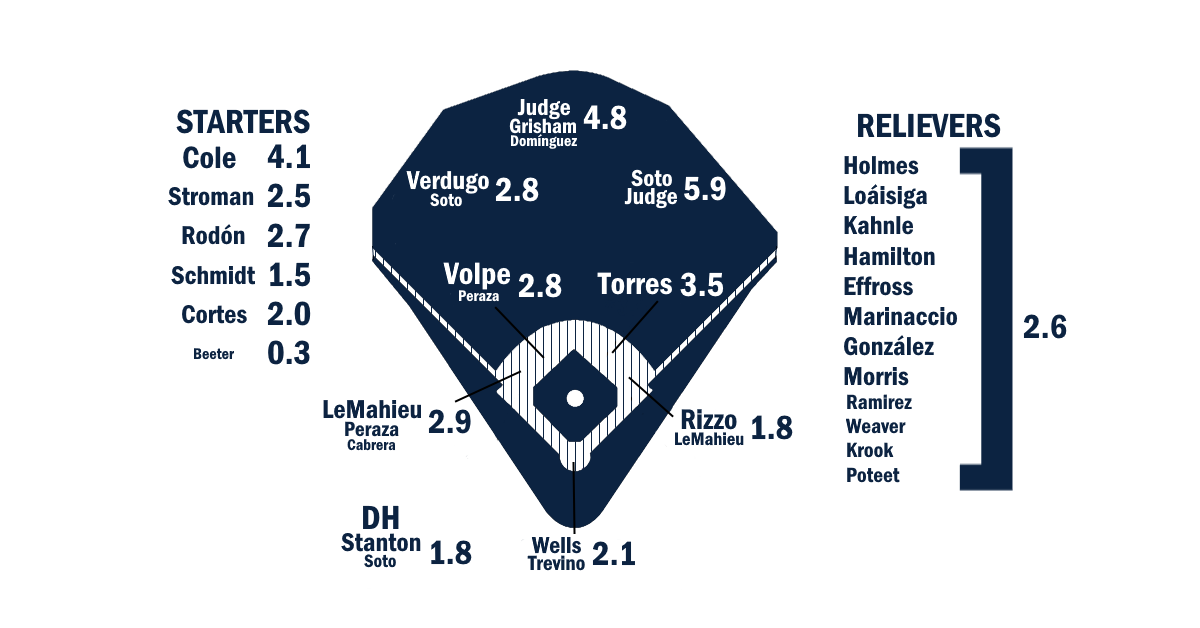How Apple's Ecosystem Indirectly Supports Google's Dominance

Table of Contents
While Apple and Google are often positioned as arch-rivals, a closer examination reveals a surprising symbiotic relationship. Apple's highly successful ecosystem, though seemingly a walled garden, inadvertently contributes to Google's continued dominance in several crucial areas. This article delves into how Apple's seemingly closed environment indirectly fuels Google's global reach and substantial market share. We will explore the key ways Apple's actions, often perceived as independent, actually bolster Google's power in the digital world.
Apple's Reliance on Google Search as the Default Search Engine
Massive iOS User Base Fuels Google's Search Revenue
Apple's massive user base on iOS devices – iPhones and iPads – translates into billions of searches conducted annually using Google Search, the default search engine. This enormous search volume directly contributes to Google's colossal advertising revenue, cementing its position as the world's leading search engine. This lucrative partnership, despite persistent rumors of Apple developing its own search engine, effectively solidifies Google's dominance.
- Billions of Searches: The sheer volume of searches performed on iOS devices provides Google with invaluable data and substantial revenue.
- Advertising Revenue: This data fuels Google's targeted advertising, further increasing its profitability and market strength.
- Exclusivity Deal: The continuing exclusive deal between Apple and Google underscores the mutually beneficial, yet arguably unbalanced, nature of their relationship.
Impact on Smaller Search Engines and Competition
The default status of Google Search on iOS effectively marginalizes smaller search engines, significantly hindering their ability to compete for market share. This lack of competition allows Google to maintain its dominance, potentially stifling innovation within the search engine landscape. Many iOS users remain unaware of viable alternatives, unwittingly contributing to Google's continued reign, even on Apple's own devices.
- Limited Visibility: Smaller search engines struggle to gain traction when overshadowed by a pre-installed, deeply integrated giant.
- Reduced Innovation: The lack of competition can lead to slower innovation and less diversification in search engine technology.
- User Inertia: The ease and convenience of using the default search engine prevents many users from exploring alternatives.
The App Store Ecosystem and Google Services Integration
Google Apps' Central Role in iOS Functionality
Google services like Gmail, Google Maps, and YouTube are deeply integrated into the iOS experience, despite being non-Apple products. This seamless integration ensures users remain firmly within the Google ecosystem even when using Apple devices. Apple's design philosophy, focusing on user-friendliness and seamless experience, unintentionally boosts the reach and usage of these Google apps.
- Seamless Integration: Google apps are easily accessible and integrated into iOS functionalities, making them convenient for users.
- Increased Usage: This convenience leads to increased usage of Google services, even by Apple device users.
- User Retention: The ease of access helps retain users within the Google ecosystem.
Indirect Promotion of Google's Advertising Network
Many apps available on the App Store utilize Google's advertising platform, AdMob, generating increased ad revenue for Google. The sheer number of apps on the App Store translates into a massive audience for Google's advertising network, further expanding its reach and influence. This indirect revenue stream significantly reinforces Google's financial strength, allowing for continued investment in its services and expansion into new markets.
- AdMob Integration: Numerous App Store apps utilize Google's AdMob, increasing ad impressions and revenue.
- Wider Reach: The App Store's vast user base exposes Google's advertising to a significantly large audience.
- Financial Reinforcement: The revenue from this indirect advertising stream strengthens Google's position in the market.
Data Sharing and Privacy Implications
Data Collection and Cross-Platform Tracking
While both Apple and Google emphasize user privacy, data collected by Google through its integrated services on Apple devices contributes to its comprehensive user profiles. This data fuels targeted advertising, significantly enhancing Google's ad revenue model, regardless of the device platform. The complexity of data sharing across platforms makes it challenging to truly limit data collection.
- Comprehensive User Profiles: Google builds detailed user profiles through data gathered across multiple platforms, including iOS.
- Targeted Advertising: This data facilitates highly targeted advertising, maximizing advertising effectiveness and revenue.
- Data Silos: The intricate nature of data sharing makes complete control and limitation challenging for both Apple and Google users.
The Interplay Between Apple’s Privacy Focus and Google’s Data Usage
Apple's growing focus on user privacy, while beneficial, doesn't entirely neutralize Google's data collection capabilities. Google's sophisticated data analytics algorithms continue to leverage the data it collects, irrespective of platform-specific privacy settings. The tension between Apple's privacy initiatives and Google's data utilization highlights a complex relationship shaping the digital landscape.
- Privacy Paradox: Apple's increased privacy measures don't fully prevent Google from collecting data.
- Sophisticated Algorithms: Google's data analysis remains powerful, extracting insights regardless of privacy settings.
- Ongoing Tension: The ongoing conflict between privacy concerns and data usage continues to define the digital environment.
Conclusion
In conclusion, although Apple and Google engage in fierce competition in certain areas, Apple's ecosystem inadvertently provides considerable support to Google's dominance. The default search engine, app store integrations, and data sharing dynamics all contribute significantly to Google's market leadership and substantial revenue streams. Understanding this complex interplay is crucial for navigating the modern digital landscape. To delve deeper into how the relationship between these tech giants shapes the online world, continue exploring the intricacies of Apple's ecosystem and its impact on Google's dominance.

Featured Posts
-
 Ufc 315 Shevchenko Vs Fiorot Expert Predictions And Best Odds
May 12, 2025
Ufc 315 Shevchenko Vs Fiorot Expert Predictions And Best Odds
May 12, 2025 -
 Dals L Avis Tranche Sur L Ouverture D Ines Reg Natasha St Pier Epargnee
May 12, 2025
Dals L Avis Tranche Sur L Ouverture D Ines Reg Natasha St Pier Epargnee
May 12, 2025 -
 Celtics Guard Payton Pritchards Sixth Man Of The Year Bid
May 12, 2025
Celtics Guard Payton Pritchards Sixth Man Of The Year Bid
May 12, 2025 -
 Ufc 315 Montreal Belal Muhammad Vs Jack Della Maddalena Fight Card Date And Viewing Guide
May 12, 2025
Ufc 315 Montreal Belal Muhammad Vs Jack Della Maddalena Fight Card Date And Viewing Guide
May 12, 2025 -
 Key Aaron Judge Analytics Predicting Yankees 2025 Success
May 12, 2025
Key Aaron Judge Analytics Predicting Yankees 2025 Success
May 12, 2025
Latest Posts
-
 Het Einde Van Een Icoon Thomas Mueller En Bayern Muenchen Gaan Uit Elkaar
May 12, 2025
Het Einde Van Een Icoon Thomas Mueller En Bayern Muenchen Gaan Uit Elkaar
May 12, 2025 -
 Het Afscheid Van Thomas Mueller Een Bittere Pil Voor Bayern Muenchen
May 12, 2025
Het Afscheid Van Thomas Mueller Een Bittere Pil Voor Bayern Muenchen
May 12, 2025 -
 De Vernedering Van Kompany Analyse Van De Mislukking
May 12, 2025
De Vernedering Van Kompany Analyse Van De Mislukking
May 12, 2025 -
 Kompanys Team Lijdt Vernederende Verlies
May 12, 2025
Kompanys Team Lijdt Vernederende Verlies
May 12, 2025 -
 Bitter Einde Voor Bayern Muenchen Het Vertrek Van Thomas Mueller
May 12, 2025
Bitter Einde Voor Bayern Muenchen Het Vertrek Van Thomas Mueller
May 12, 2025
